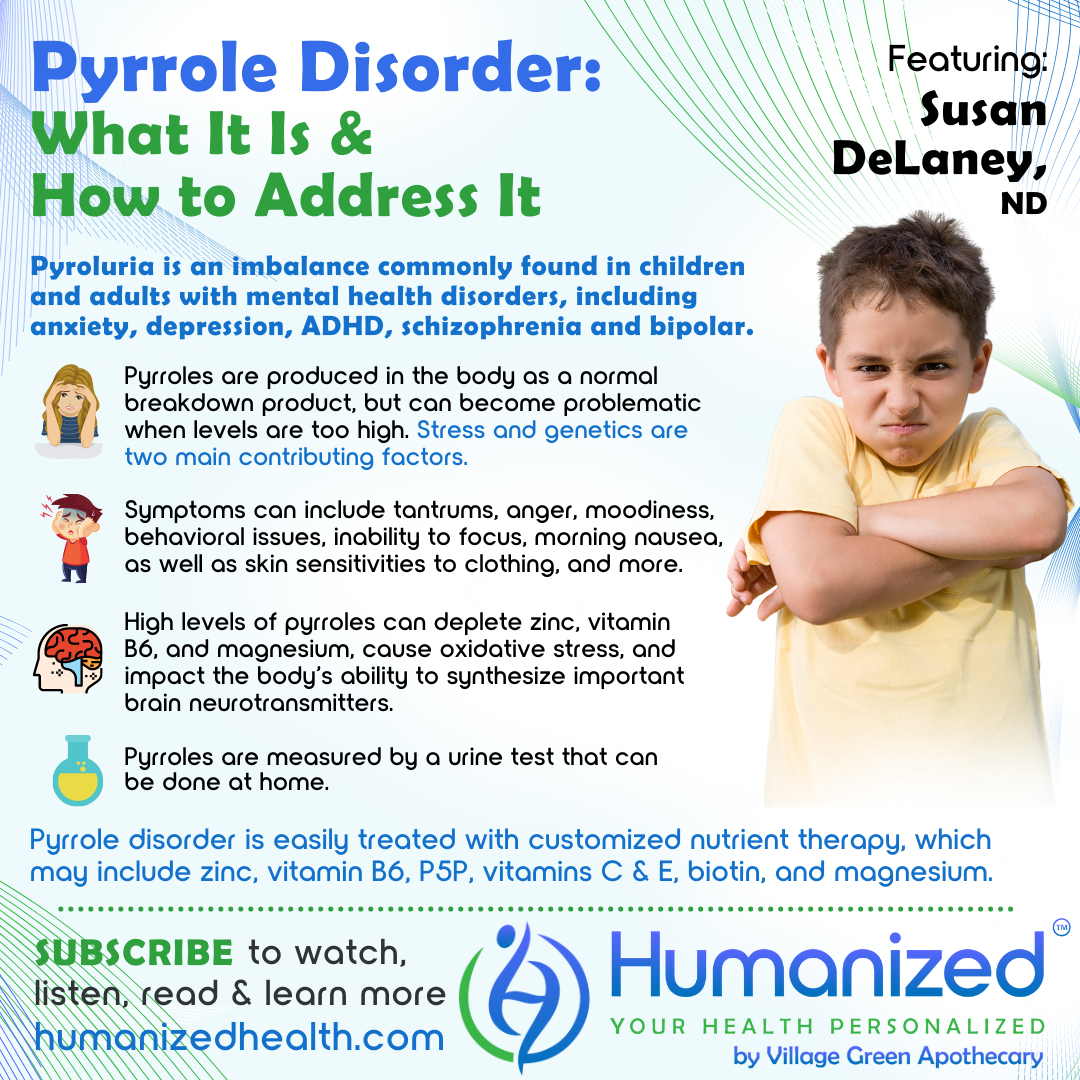Pyrrole Disorder: What It Is & How to Address It
Featuring
Susan DeLaney, ND, RN
WATCH
LISTEN
READ
Rebekah Kelley: Welcome to the Humanized podcast, all about personalizing your health. I’m your host, Rebekah Kelley, and today our topic will be Pyrrole Disorder, What It Is and How to Address It, with Dr. Susan DeLaney. Before I introduce Dr. DeLaney, I want to remind everyone to subscribe and get all the other variety of casts in audio, video and transcription at HumanizedHealth.com. I’d also like to thank our lead sponsor, Village Green Apothecary, at MyVillageGreen.com.
So, Dr. Susan DeLaney has practiced naturopathic medicine in North Carolina for over three decades. Over the years, she’s observed that the health of many people, including children, has greatly declined while the number of prescriptions has dramatically increased. By using a natural approach to healing, she’s able to help people become less dependent on prescription drugs and improve their health and vitality. In her practice as well as in her lectures, Dr. DeLaney inspires people using up-to-date nutrition science to take personal responsibility for their own health journey. Dr. DeLaney is passionate about educating individuals and their healthcare providers about the benefits of advanced nutrient therapy for balancing biochemistry, as well as the nutritional value of eating real food and healthy fats. Dr. DeLaney’s latest project, Your Health is No Big Thing, It’s a Million Little Things, provides links to 13 educational videos to help people learn more about healthy fats, the importance of fat-soluble vitamins, as well as simple changes individuals can make to improve their health.
Dr. DeLaney, thank you so much for being here with us. It’s always a pleasure. So I was excited that you were coming back.
Susan DeLaney: Thanks. It’s great to be here.
Rebekah Kelley: So, let’s jump right in. What are urine pyrroles and why do we measure them for mental health issues?
Susan DeLaney: So urine pyrroles are actually a normal breakdown product that everyone has. You have them. I have them. And it’s a breakdown product of hemoglobin, which is part of our red cell structure. So, there are people that have different levels of pyrroles and when it gets above 10 to 15, that is a mild pyroluria. And then if it goes further up to 15 to 25, that’s moderate, and above 25 and 30, that’s pretty severe.
And there’s not a problem with the pyrrole itself. It doesn’t hurt you. But what it does is it steals your zinc and B6, and also magnesium. So it doesn’t allow these nutrients to be absorbed into your bloodstream for your body to use them. And as you know, magnesium is a nutrient that’s important for a variety of things, but it’s very calming. It helps people calm down. Zinc and B6 are two of the main components that you need to make or synthesize neurotransmitters for your brain. So basically, you can’t make serotonin, your happy hormone, unless you have B6, and you can’t make GABA, which is your calming hormone, inhibitory, versus excitatory, so if you don’t have enough zinc, you can’t make it. So there are ways you can, take Xanax and take GABA, a variety of different things, but it’s much better if you can just make your own. And so these people, often children, but adults are being depleted of these nutrients because their pyrroles are high and they’re just sucking them out into the urine. And you don’t notice. It’s not like you notice you’re passing these minerals and nutrients.
Rebekah Kelley: Wow. So you can’t tell that you’re passing [them] out, but what kind of behavior might you see then? What would kind of flag that there might be higher urine pyrroles?
Susan DeLaney: Oh, in children, the main thing you would see is tantrums. They can be very angry, irritable, some people call them moody, everything sets them off. They can have inability to focus and concentrate. You might see underachievement. This is in adults, as well. And, everything sets them off. So you might think of the child, maybe they have hyperactivity or ADHD, but they really don’t have that. In adults, it’s confused with bipolar disorder because it comes along with lots of anxiety, and they don’t feel well.
You can get a few physical symptoms, as well. So these children are often nauseous in the morning and they don’t want to eat breakfast, and they prefer not to eat in the morning. They can also have a [skin] sensitivity to tags in their clothes, in the back of their shirts, or different types of fabrics – they have that. They often have something called a pain in their spleen, in that spleen area. They can have a fruity breath.
Not everyone has all these symptoms, but occasionally you see some of these, so there are physical symptoms, but really where it’s manifesting in people is in this behavior. And you’ll sometimes see it in criminals, people are just extremely testy. Things like SSRIs or medications will help, but they won’t fix this. They just take the symptoms down. So addressing the underlying issue and supplementing with these things really, really help these people.
Rebekah Kelley: Wow. Wow. Yeah, all those little things certainly can add up too, right? It can make a person to where, you know, you might not always want to be around them, because they’re cranky, right? There’s a lot of… and as a family member, if it’s something where you can just support their nutrition and help them feel better, that would be amazing. So how long does it take for the treatment regimen to be effective?
Susan DeLaney: If it’s just a true pyroluria, parents will begin to see improvements in their children in 2 to 3 weeks. Dr. Walsh says this is the easiest imbalance to treat. And when we treat them, we give them the appropriate dose, based on their weight. So each child gets a different prescription, depending on their weight. But you will begin to see normalizing of behavior within 2 to 3 weeks.
And one other thing about pyroluria. Actually, lots of stress can cause people’s urine pyrroles to go up, but you can also have a genetic pyroluria, as well. And these might be people who need to be on this forever. But most people, you get them treated and lower their dose and they manage them and maintain on that. And occasionally retesting, if you see the behavior being out-of-whack again, so to speak.
Rebekah Kelley: So, can you give me some examples, or maybe you have an example from your experiences, of somebody that might have had this issue that was treated and then what the outcome ended up being, how their behavior was changed? Because I think sometimes it’s just so helpful to hear a story that kind of helps attach it and make it real.
Susan DeLaney: Sure. So you’ll have a child who is aggressive and acting out and angry and running around your office and opening your drawers and being disrespectful towards their parents. And they have really had it, at this point, because they’ve maybe tried other treatments. And then you start the appropriate nutrient therapies, the zinc, the B6, P5P, which is an active form of B6. And we also use antioxidants because high pyrroles is an expression of oxidative stress. So they get some C and E and biotin, a little bit of magnesium. And you know, when they come in your office in 3 to 4 weeks and they’re sitting there calmly, they’re talking to their parents, they’re answering your questions instead of being hostile. Yeah, those are happy parents and happier kids, because I think they get targeted often as being bad children because they have bad behavior. They are not. They’re really sweet and wonderful kids, but their biochemistry is just driving this underneath. I think it’s really important for parents to know that this is not a bad kid. Their biochemistry is just altered. And if you can rearrange that, it helps everyone in the family tremendously.
Rebekah Kelley: Right. And help them, right? Help them, because I’m sure they’re not in a comfortable place if that’s what their behavior is, right? Their outsides are probably matching their insides, right? So as a parent, you’re helping them so that they can actually have tools to manage their behavior. They just don’t have the tools.
How about an adult? Have you seen that happen or have you treated someone as an adult? What can that look like? Because children, obviously, right? But as an adult, you obviously aren’t running around screaming, are you? Because you can’t really do that and exist in society, but maybe there’s other things that are happening…
Susan DeLaney: Well, one of the worst cases I’ve seen was in a 23-year-old and that person had some other imbalances, as well. But we’re talking even with psychiatric meds, the father was needing to hold him down every day, because he was putting holes in the walls. So, that’s a challenge. And that’s the other thing is that you can have pyroluria with other imbalances, with a methylation imbalance, or copper imbalance, and that makes it worse. You don’t have holes in the walls anymore with this.
Rebekah Kelley: Oh, that’s good news. Well, and it’s got to be scary as a parent to have an older child like that, because the holes in the walls are, I’m assuming, related to anger and inability to control one’s emotions. And that can be scary, especially for an older male, right? And especially for parents that are aging, too. So, wow. And it’s just, you know, as it relates to a family, that’s not a family dynamic we’re seeking. So that’s amazing, what an amazing story.
Thank you, Dr. DeLaney. Really valuable insights. Dr. DeLaney can be found at www.TheWellnessAlliance.com. I’m going to spell that. That’s T H E W E L L N E S S A L L I A N C E.com. Let me remind you to subscribe and get access to all Humanized videos, podcasts and transcriptions from all of our thought leaders, like Dr. DeLaney, on personalized health at HumanizedHealth.com.
Please come back and see us again. That was great.
Susan DeLaney: Thanks for having me.









